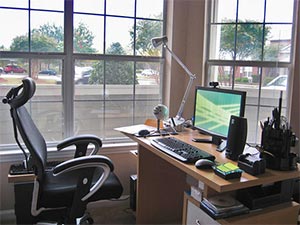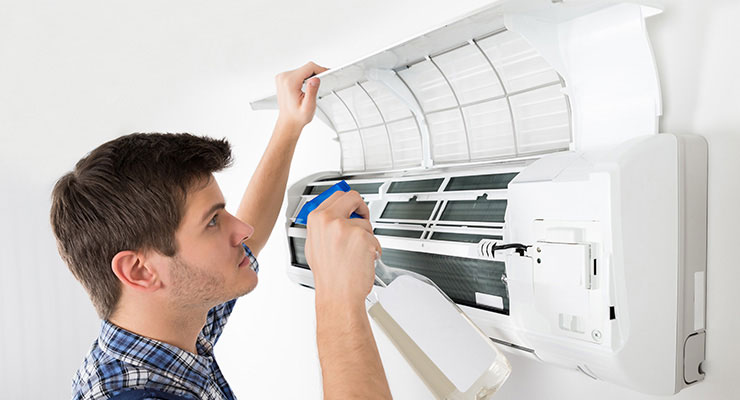If you walk past an open window with a sunbeam coming through, you’ll notice a very common sight: tiny, near-invisible particles floating in the light. This, of course, is dust, and it’s no exaggeration to say that it’s everywhere—as homeowners all around the globe know all too well.
Tiny pieces of fabric, dead flakes of skin and hair, microscopic specks of dirt or sand—for the most part, tiny amounts of dust are completely normal and entirely harmless. We rarely notice them until it’s cleaning time. However, if not addressed properly, dust and dirt can have a negative effect on your home’s air conditioning and heating, whether central air or window units. Let’s examine how dirt and dust affect HVAC efficiency and what you can do to fight it.
Table of Contents
The Problems with Dust and Air Conditioning
On the most basic level, all air conditioners, no matter how simple or how fancy, work on the same fundamental design principle. Warm air from inside your home, office, car, or other location is sucked into a unit. The heat is removed thanks to special cooling fluid. The warm air is expelled outside, and the remaining cool air is blown back in, keeping your living environment comfortable. If you were to stand right outside the external end of the AC unit, you’d find that it’s quite hot!
Because the air in your home is constantly being sucked into the AC system, all of the particle matter in the air—that is to say, dust—comes along with it. This would be undesirable if you have a window or floor unit, but it is especially problematic in a central HVAC system.
Dust can build up on the internal components of the air conditioner, like the condenser, and can significantly increase wear and tear and the odds of a break, making it more likely that you’ll need costly repair work sooner rather than later.
Even before dirt and dust ever get to sensitive internal machinery in an HVAC system, though, it can build up along the walls of your air ducts. This decreases HVAC efficiently dramatically—imagine blowing through a blocked straw. Mold can also grow on the interior of the ducts, meaning that your trusty central air may be spreading irritants through your home that can cause respiratory problems, particularly in younger or older individuals or people living with illness.
Obviously, for all these reasons, you want to prevent dust and dirt from getting into your air system as much as you possibly can. So how can you take care of your air conditioning and protect it from dust?
Air Filters: Why They’re Important and When to Clean (or Change) Them
Of course, the internal components of the air conditioning unit aren’t meant to be exposed to dirt and dust on their own. An air conditioner or HVAC system will have a filter in place that will, ideally, stop the particulate matter from getting into places it shouldn’t.
However, the filter can be a sensitive component of the system in its own right, and if not properly cared for, can develop wear and tear that makes it less effective. A clogged filter will, like obstructed air vents, also hamper the efficiency with which the system is able to process air. In worst-case scenarios, an exceptionally dirty filter can even become a fire risk.
HVAC systems today often use disposable air filters. If the filter is dirty, just pull it out and insert a clean one. If you have a reuseable air filter, cleaning an air filter isn’t a particularly difficult task and can be easily done at home with a vacuum cleaner and running water. We recommend you clean your air filters at the beginning of the season you expect to use heating or cooling—for example, in late spring as the weather starts warming up—and, when in use, once a month for optimal life span and air efficiency.
In the event that you need a new air filter entirely—for instance, if something has happened to the current one or if it’s simply nearing the end of its service life span—it’s important to know what to look for.
Air filters are categorized according to the Minimum Efficiency Reporting Value rating, or MERV. The higher the MERV value, the finer the filter and the more particulate matter it blocks. MERV numbers above 14 are typically found in extremely clean environments like hospitals. Most residential or office HVAC systems will have filters with a MERV rating of 5 to 12. While filters with higher MERV values are better at blocking dust and dirt, they also need to be replaced more often, so you should know the MERV rating of your home filters.
Cleaning Ducts and HVAC Equipment
Of course, while filters can be very effective, there may still be particulate matter that gets into your HVAC system via the air ducts. According to the US government’s ENERGY STAR® program, up to 30 percent of the air moving through a duct system can be lost to leaks and holes. If air is getting out of the ducts, then particulate matter is getting in.
Most of us don’t see the inside of our HVAC ducts on a daily basis, so it can be difficult to know when you need to get yours professionally inspected or cleaned. It’s good to get in the habit of inspecting your ducts with a flashlight whenever you remove the filter for cleaning, which, as previously mentioned, should be about once per month.
If you see any signs of excess dirt or dust buildup on the inside of your air ducts, and especially if you see anything that could be mold, it’s definitely time to have your ducts professionally cleaned and inspected for leaks. Not only will this help your HVAC efficiency, but it can reduce the air loss mentioned earlier, making your home more energy efficient.
A professional HVAC technician can also inspect your heating and cooling units by looking for dust buildup and wear and tear elsewhere, making sure that you can forestall any problems before they wind up leading to costly repairs.
If you’re looking for an expert to inspect your HVAC system to ensure maximum HVAC efficiency, contact Entek for your home air quality needs. Entek has been a trusted specialist in the greater Portland metro area for over seven decades—call us to see why.












Leave a Reply